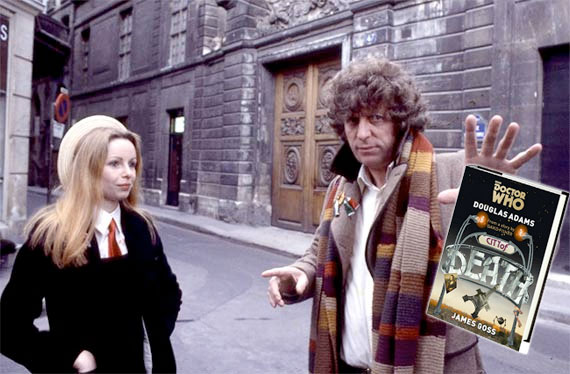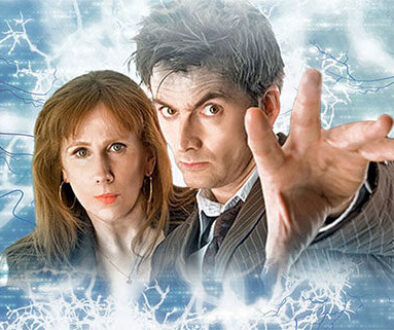Interview: James Goss on City of Death
Patrick Kavanagh-Sproull speaks to the Doctor Who author.

After the excellent Dead of Winter some years back, the sweet and poetic ‘co-authored’ Summer Falls and the remarkably uncompromising The Blood Cell, James Goss was an inch-perfect choice to tackle the belated novelisation of City of Death. The result? A witty, superbly written gem that I could wax lyrical about for hours (my review of it – in which I do just that – is here).
I got the chance to pose a few questions to Goss about the legacy of City of Death, the challenge of taking on such a mighty project and what’s next for him.
Compared to the Who books you’ve written in the past, City of Death is totally different because you already had the template for the story in Douglas Adams’ script. Considering its origins, was City of Death more of a challenge than past Who projects?
Getting started was horrible. I’d sidle past it. I’d pick at a sentence here, trying to construct it ever so carefully, pitifully aware that every wrong word would be criticised somewhere on the internet. Then I sort of figured “Are you really thinking that no-one will actually read this book to enjoy it? Seriously? And if you’re not enjoying it, then how do you expect anyone else to? You may as well just accept that you’ll get some bits right, some bits wrong, and just have fun.”
After that it became much easier. The hardest thing about writing a book is working out who’s going into a room, why they’re there and what they’re going to say. All that was taken care of for me, and taken care of for me by Douglas Adams. For three months, going to work every day was just the most enormous fun. Sometimes I’d stop writing, have dinner, start again, go to bed and then wake up in the middle of the night. I was writing a Target novelisation! Of City Of Death! When I wasn’t working I was trying not to get run over by a bus. That would have been very embarrassing, and annoyed the publisher.
The story of City of Death is a well-known one, it constantly tops polls and has gone on to become a jewel in the Who crown. Were you ever worried while writing that the story would be too familiar?
Well yes. Again, initially my fear was of an internet review that said “While Goss manages to type most of the funny lines correctly…” and then I just shrugged. The problem is we’ve all been laughing at that brilliant dialogue for so long, do we still find it funny? Most of us can recite chunks of the “Wonderful Butler” scene like it’s our “Dead Parrot” sketch.
Just because that’s the case, doesn’t mean I should go about changing it just to be different. If the Doctor stuck to the original script and just said “You’re a very beautiful woman” there would rightly have been fury. Also, it wouldn’t be as bizarre as what we do get – and that’s the point.
Hopefully this book will be read by people who’ve never read a Doctor Who book before but have gone “Oh, Douglas Adams… I wonder what it’s like?”. And therefore all those wonderful lines have to be waiting inside to greet them. Which means that when the Doctor meets the most stylish woman in the world he shrugs “You’re a beautiful woman, probably.”
City of Death is an inherently funny script but I found myself laughing at a lot of the jokes you wrote in – did you ever try and mirror Adams’ humour or did it just come naturally in the writing process?
Good. I am pleased. But hopefully you didn’t notice me too much. Like a butler, it’s not my job to be noticed, but to make sure you have a good time. (Whilst at the same time wanting desperately for someone to wander over and go “That bit was you, wasn’t it? Quite good, Jeeves, quite good.”)
Mind you, for the most part, there aren’t vast new sections of dialogue written by me. Those that are there more than likely come from the rehearsal script. Imagine that lovely feeling of turning the script over and going “But there’s a whole extra page of City of Death here. That’s unexpected!” Hopefully I’ve conveyed some of that joy.
There are a couple of bits of Adamsesque musing – such as Romana learning about the history of art, or a whole new way of describing the TARDIS noise. But they arrived because I found them funny rather than because I wanted a chance to show off. Oh, I hope it comes over that way, rather than the bit-player trying to upstage the star with frantic mugging.
How much breathing room did you have when writing City of Death – did you ever feel tempted to ever-so-slightly break off from the original story?
Well, purists can pretty much skip the first chapter, which isn’t so much Douglas Adams as a Dan Brown pastiche. You know how he spends his first chapters carefully putting all his professors, spies, and assassins in place before the story begins? I thought “how lovely to do that… and then have the story become City of Death – after all, wouldn’t the Da Vinci Code be even better with jokes in?”
I don’t know how well it works, but if you’ve ever wondered where the Count’s computer came from or what his wife’s first name is, then hopefully you’ll find something in there.
There’s also an extra bit here and there – such as during Romana and Duggan’s long night in Paris. Again, hopefully it doesn’t get in the way. The truth is, it’s such a well-plotted story, there really isn’t that much else you can do with it. You could have had the Doctor and K-9 go off to visit other fragments of Scaroth throughout history, but, as you wouldn’t be learning anything new, they would just be padding.
In my first week I got an email from Michael Stevens who was producing the audiobook asking how much extra K-9 there would be. And yes, it’s such a shame that K-9 isn’t in City of Death, but where would you put him? I worried about that for a whole day. Take any scene, add K-9, grin broadly, and then realise that he’d immediately solve the mystery or shoot the villain. He gets to do some extra stuff – I’m very pleased about that, as to ignore him completely would be wrong.
Anyway, the story of City of Death is quite intricate – it’s a complicated time-travel script in which every element pays off or is carefully explained. Add too many extra ingredients and you risk people going “huh?” rather than “hah!”
In the coming months we’re going to be seeing more of you (that’s certainly not a bad thing) with a couple of Twelfth Doctor audio adventures – is there anything you could tell us about them?
The audio adventures are part of a linked series. Basically it’s about a family who have something they really shouldn’t, and how that dynasty gets in the way of the Doctor’s life. I’ve been working on it with George Mann, so you should get a nice balance between the Epic Sweep Of Empire Falling and the more domestic, petty things that clog my life. The first one is about the Doctor having to solve a problem that’s beneath him. He knows it is, he’s frankly insulted by it… but it also turns out to be about something rather more complex.
Another project on your plate is a novelisation of Douglas Adams’ other Who story, The Pirate Planet. Have you started work on it and what can we expect (other than that dreadful little robotic devil-parrot)?
Well, I’ve started it. Already I’ve run out of synonyms for “jewel” and I’m a bit stuck and rather cross with myself. Again, I’m starting with the scripts rather than the finished show, which throws up a great idea of how Douglas Adams hoped the story would look before the hideous economic difficulties of making television in the late 1970s got in the way.
James Goss, thank you very much.
City of Death is released 21 May.








